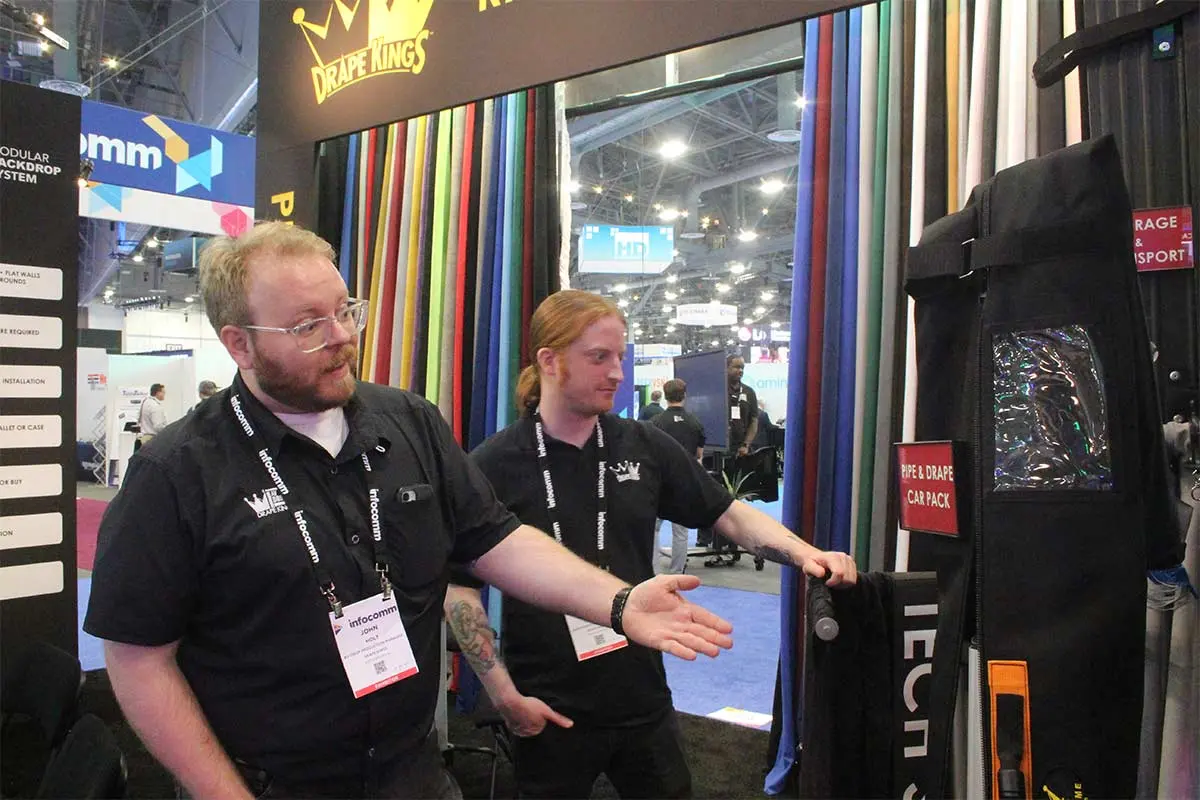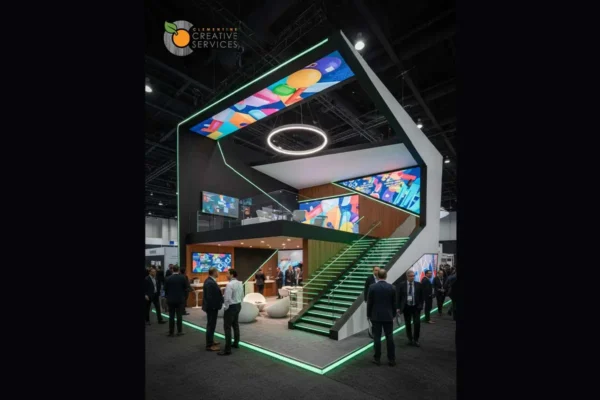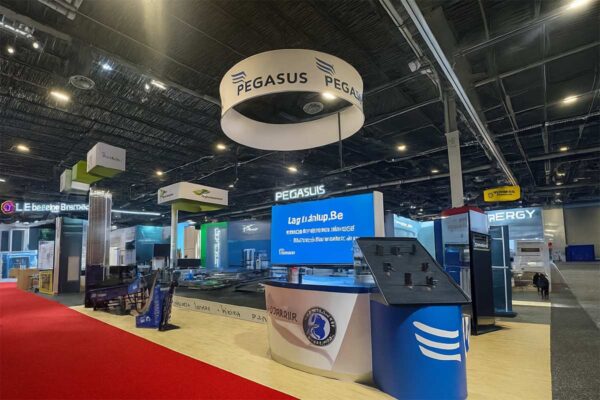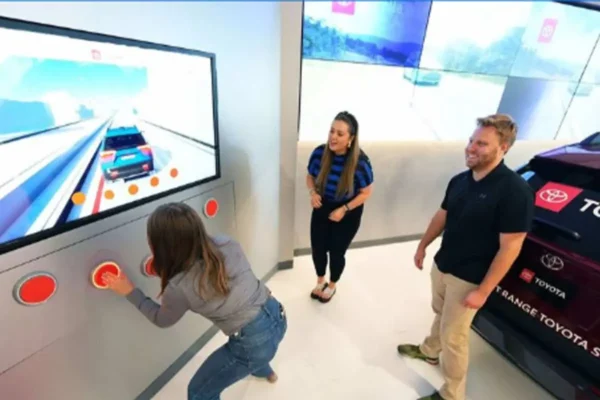(John Holt, AV Drop Production Manager at Drape Kings, demonstrates the versatility of the Pipe & Drape Car Pack to attendees at the 2024 InfoComm held at the Las Vegas Convention Center. Photo by Mark Hebert, Exhibit City News.)
Written by Cameron Wilkinson, The Trade Group
Trading and industry thrive on randomness, cross-pollination, and chance meetings.
When tradeshows focus on their primary function of facilitating deals and new partnerships, they are truly antifragile, able to not only survive world-changing events but get stronger as a result.
Statistician and best-selling author Nassim Taleb developed the concept of antifragility in his book Antifragile: Things That Gain from Disorder. When something is fragile, it breaks under pressure; if it withstands the pressure unscathed, it is merely resilient. For something to be the opposite of fragile, it must become stronger as a result of being under pressure. It is this quality which Taleb calls antifragile.
Antifragility is not a new concept. Take the mythical Greek creature Hydra, which has multiple heads. When one is cut off, two grow back in its place. The English language also has idioms that describe the trait, such as “what doesn’t kill you makes you stronger.” Bountiful examples can be found in nature, our own bodies, for instance. We introduce shocks to our bodies when working out, and our muscles get stronger.
Taleb seeks antifragile investment strategies. According to Taleb, almost all scientific and economic breakthroughs are “Black Swans,” meaning they are undirected and unpredicted. Rare and unforeseen events have an outsized impact on our lives when compared to extended periods of focused energy and planned direction. Taleb seeks to make his investment strategy as antifragile as possible.
Example: Book publishing is antifragile
The publishing industry bets on randomness. In surprising ways, it is strikingly similar to venture capital.
The Big Five make their profit by selling the same 50-or-so books that have remained on the bestseller lists for decades—sometimes longer. Meanwhile, they make thousands of small bets each year, hoping to find the next big hit. The vast majority of these bets fail as most new books sell less than a hundred copies. Years go by before there is a major success. The most memorable book series with an outsized impact was Harry Potter, which now has its own themed resort.
A single impactful bestselling book is more than enough to cover the tens of thousands of bad bets—and it’s the gift that keeps on giving. The Lord of the Rings was published 70 years ago and is still raking in sales.
Is the tradeshow industry antifragile?
It is undeniable the industry takes hits from unexpected, earth-shattering events. The question is, does the industry benefit from them? Is it an outsized benefit?
Possibly.
Consider the industry’s track record.
- Tradeshows benefited from the decline of empires that primarily used World Fairs, like the Great Exhibition of 1851, to display their nation-building prowess—not to facilitate free trade. Tradeshows ceased operating as a stage and became an essential part of the fabric of the modern global economy.
- After WW2, demand for tradeshows exploded as businesses pivoted from military manufacturing to commercial production. In the decades following, new convention centers were built to fill the need for meeting space.
- Tradeshows absorbed the digital revolution by allowing attendees and exhibitors to access educational sessions and keynote addresses through livestreams or recordings—a true value add.
- Tradeshows, fairs, summits, and conferences are older than air travel and were resilient enough to endure the brief dip in travel and hospitality following the 9/11 terrorist attacks.
- It boasted record-breaking levels of participation and growth eleven years after the 2008 financial crisis.
- Despite canceled events and significant losses due to the 2020 lockdowns, events bounced back as demand for face-to-face meetings surged in response to online meetings. Applications of virtual meetings, the metaverse, and AI were explored.
In each case—the fall of empires, WW2, the Internet, etc. —the tradeshow industry morphed into something slightly stronger.
The tradeshow industry is truly exciting. Think of all the new associations, tradeshows, and conferences that were created after the invention of the Internet. New and unexpected technologies, products, and devices create entirely new shows—and big ones at that; would we have any cybersecurity conferences like Black Hat USA or RSA? What about the Consumer Electronics Show?
If that is not antifragile, what is?
Why choose optimism
To be sure, businesses have had to close their doors because of these events. But we must acknowledge that new and unexpected doors have opened, too.
For example. One of the biggest problems facing the industry right now is rising show services and shipping costs. If the tradeshow industry were fragile, this would threaten to topple it. Instead, we’re seeing new innovations and technologies to address it, such as robots marking the exhibition hall before the event moves in. August Robotics is promoting this new technology, which is already in use. The industry may be able to expect more such innovations on the show services front.
Shipping is another pain point, but that is not confined to the tradeshow industry. Due to strained supply chains, shipping costs have increased in many other industries, which is why Kodiak is leading the charge in developing driverless semis, which are already being tested on Texas highways.
Far from any doom and gloom in the tradeshow industry, we might rather expect that in the next 100 years, the construction of the first convention center on the moon will be completed and ready to host its debut interplanetary conference.
The Trade Group
Need general contracting for your next event or exhibiting at a show? Build with us.
























